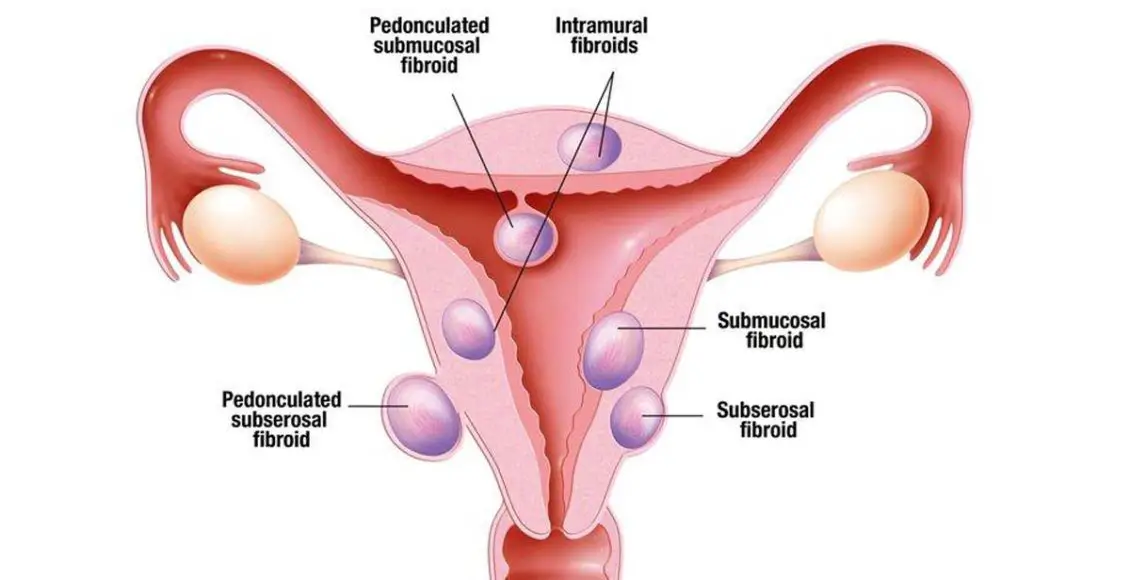Fibroids are non-cancerous growths that lodge in the wall of the uterus.
The growth affects about 3 in 4 women, according to NIH. Although some women experience little to no symptoms at all, others feel discomfort, pain, and complications. Uterine fibroids vary in size and can be as small as a bean or large as a melon.
What causes fibroids?
Medical researchers and doctors still do not know what causes fibroids. However, they believe that female hormones, progesterone, and estrogen, increase the risk of developing fibroids. Women who start menstruation early, come from families with a history of fibroids, are aged between 30 and 40, are obese, and/or consume lots of red meat are thought to be at higher risk.
Are uterine fibroids dangerous?
It is scary to have something (of course other than a baby) grow in your uterus. But if it’s any consolation, fibroids are benign. In fact, the chances of having a cancerous fibroid are less than 1 in 1000. Having fibroids doesn’t increase your chances of getting a cancerous fibroid. Again, these growths don’t lead to health problems – though they can cause discomfort, pain, and sometimes anemia. They can also make it hard for a woman to conceive, and the event one becomes pregnant, have complications like preterm delivery, miscarriage, or breech baby.
What are the symptoms of fibroids?
As mentioned earlier, fibroids can be asymptomatic or symptomatic. Some commonly reported symptoms include:
- A frequent urge to pee
- Bloated abdomen
- Pain in the leg, pelvis or lower back
- Pain or discomfort during sex
- Abnormal bleeding
- Constipation or trouble emptying the bladder
These symptoms may vary depending on the size and number of the fibroids, as well as its location. Usually, those located inside the inner cavity of the uterus often cause menstrual issues and problems conceiving. While those on the outside lead to lower back pain or bladder issues.
What are the treatment options for fibroids?
Fibroids don’t always need treatment. In some cases, the doctor may recommend a watchful waiting approach. However, if you are in pain or experiencing other symptoms, then he or she may prescribe medication or perform procedures like hysterectomy, myomectomy, or uterine fibroid embolization. He or she may also perform an MRI-guided focused ultrasound surgery, which is a non-invasive and out-patient uterine fibroid treatment.
When is treatment necessary?
Fibroids, irrespective of the size, do not produce symptoms. So unless you are having a hard time because of the condition, you don’t need to go through treatment. You also won’t need treatment if you are approaching menopause. Specific symptoms and signs that may call for treatment, include:
- Infertility
- The rapid growth of the fibroids
- Bleeding between periods
- Painful or heavy menstrual periods leading to anemia or restriction of daily activities
- Pelvic pain
- Uncertainty about the growth type – whether it’s another tumor
What should I expect after treatment?
If your doctor suggests a watchful approach, it means he or she will not issue any treatment. However, both of you will monitor how it proceeds going forward. Sometimes, the fibroids will continue to grow until one hits menopause. Other times, they may maintain their size. If your fibroid keeps growing after menopause, then you should get medical help.
How does having fibroids and being a pregnant workout?
The good news is that you can conceive, carry a pregnancy to term, and give birth to a healthy baby even with fibroids. However, the chances of having issues during pregnancy and delivery are higher with fibroids. Some common problems associated with pregnancy and fibroids include preterm birth, labor fails to progress, the baby is breech, cesarean section, and placental abruption. That’s why you need to talk to your OB/GYN about your condition.
What questions should I ask my gynecologist if I have fibroids?
To gain as many insights as you can about your condition, you’ll need to ask the right kinds of questions. Here is a list of some questions to ask your doctor:
- What’s the size of my fibroids?
- How many fibroids are there in my uterus?
- Where are the fibroids located?
- Do you think the fibroids will increase in size?
- How do I monitor the size of the fibroids?
- What issues should I expect from the fibroids?
- What treatment options do I have?
- Which method do you recommend for my type of fibroids?


